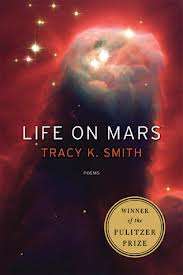Life on Mars
Tracy K. Smith
Graywolf Press
Release Date: January 1, 2011
ISBN 978-1-55597-584-5
I’ll admit it – I often have problems reading poetry.
Don’t get me wrong. I love poetry, or at least the idea of poetry. It’s an idiom that is unique, that uses the look and the cadence of language to enhance or encapsulate or simplify the ideas conveyed. It speaks to that which often cannot otherwise find a voice. I get that. I appreciate that.
But often it seems that poetry is outside my ability to experience it, to connect with it. It’s too big for me, too delicate or too complicated, too deep. It makes me feel obtuse, uncomprehending. And often it’s the “best” poetry or the most decorated of poets that have me wondering just why it is that I don’t get it, why any sort of appreciation of what is being expressed eludes me, so I assume the lack is my own sensitivity, my own ability to understand or to accept a kinship with it. It makes me feel inadequate.
So when I stumble across a poet whose works do resonate, I tend to take notice. And boy, oh boy, did I notice Tracy K. Smith. When on a whim I picked up her 2011 collection, Life on Mars, and read one of the first poems, “My God – It’s Full of Stars”, I said to myself – “Woah – dang, I get this!”
Imagine my surprise and delight to find out that this volume, Ms. Smith’s third published collection, had won the 2012 Pulitzer Prize for Poetry. Maybe me and poetry aren’t so wrong for each other after all!
Educated at Harvard and Columbia, nurtured at Stanford and currently teaching at Princeton, you might expect Tracy K. Smith’s poetry to be high strung and exclusive. But as the daughter of a space engineer who worked on the Hubble Telescope, instead her poems are full of wonder and a sense that we are a part of something so much larger than ourselves, not only cosmically, but internally and spiritually as well.
The first few pictures came back blurred, and I felt ashamed
For all the cheerful engineers, my father and his tribe. The second time,
The optics jibed. We saw to the edge of all there is –So brutal and alive it seemed to comprehend us back.
Not only are her poems personal (such as one about a patient observing her psychologist!) but her subject matter, unlike so many other collections, is elevated, yes, but not elite. Her poems encompass what most of us would talk about at a Sunday brunch among friends: family, space, love, injustice, pop culture, news headlines – and even pirates. Not the Disney version, the real life pirates who make a living off those who make a living from the seas. She uses the medium of words and meter and lilt to go right to the heart of the matter, rather than dancing at the edges.
They have guns. They know the sea like it
Is their mother, and she is not well. Her fish
Are gone. She heaves barrels leaking disease
Onto the shores. When she goes into a fit,She throws a curse upon the land, dragging
Houses, people to their deaths. She glows
In a way she should not. She tastes of industry.
No one is fighting for her, and so they fight.
Ok, what most of us would talk about at a very intense Sunday brunch.
In a series of very poignant poems (entitled “They May Love All That He Has Chosen and Hate All That He Has Rejected”, a quote taken from the “Community Rule” teaching from Dead Sea Scrolls), she takes five news reports from the New York Times from May to June 2009 wherein there has been a tragic and senseless death, and treats those stories at times as a group and at other times as separate incidents, sometimes looking at them from afar, sometimes looking at them somewhat objectively, and then looking at them in a very precious and fragile and gut-wrenching way: the victims write postcards to their killers. Another poem seeringly takes on prisoner abuse in the Abu Ghraib prison, evoking words spoken by both a US Senator and pundit Rush Limbaugh and blending them into a scathing poetic narrative:
Some of the prisoners were strung like beef
From the ceilings of their cells. “Gus”
Was led around on a leash. I mean dragged.
Others were ridden like mules. The guards
Were under a tremendous amount of pleasure.
I mean pressure. Pretty disgusting. Not
What you’d expect from Americans.
Just kidding. I’m only talking about people
Having a good time, blowing off steam.
These are powerful poems, ones that beg to be read and digested. Both personal and cosmic, spanning the expanse of space, taking what is wide and vast and making it graspable – these are not poems to read while sipping wine and nibbling brie while a string quartet plays in the background. These are poems to be read under the stars, with David Bowie playing in the background. These are marvelous poems. These poems embrace the unknown, and laugh – sometimes in irony, sometimes in joy. They are well worth the time, even if you aren’t quite sure if poetry is your thing. No worries there. Take it from me – these are.

